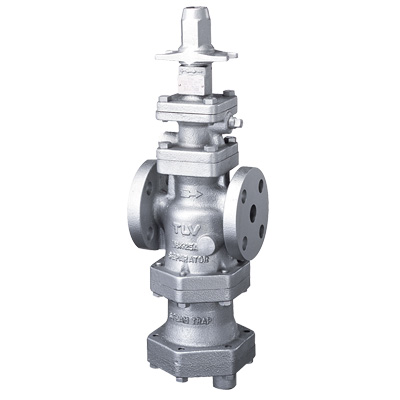- Home
- Products
- Pressure Reducing Valves
- Pressure Reducing Valves for Process Steam (with Built-in Separator & Trap)
Fluid Control Equipment
Pressure Reducing Valves for Process Steam (with Built-in Separator & Trap)
COS Series

Troublefree Pressure Reducing Valves
COSPECT®’s built-in strainer, Super Cyclonical Effects Separator (SCE) and Free Float® steam trap help prevent scale, rust and condensate from entering the pressure reducing valve (PRV) or reaching the important interior parts.
In particular, the cyclone separator forcibly removes 98% of the condensate from the flow at the inlet side, thereby greatly reducing condensate-induced erosion of parts such as the main valve.
While the standard service life of a PRV for steam is often less than a few years, many TLV COSPECT® users are still using their COSPECT® PRVs more than 10 years after installation. Such long service life is a testimony to COSPECT®'s effectiveness in countering scale and condensate, some of the most common sources of problems for PRVs in steam systems.
COSPECT® Pressure Reducing Valves Pamphlet (860 KB)
Benefits and Features
Improved Quality of Material Being Heated
- Delivers Stable Pressure
Achieves secondary pressure accuracy within ±0.01 MPa of the set level. Even if the steam flow (load) to the equipment or the primary pressure at the pressure reducing valve changes, the Shock-Absorbing Spherical Piston (SAS) supplies steam at a constant pressure in order to prevent temperature fluctuation downstream. - Supplies Dry Steam
The built-in Cyclone Separator removes condensate from steam with a condensate separation efficiency of 98%. Condensate entrained in the steam is removed, and a strainer further removes any scale. The condensate that is separated out is discharged through the built-in Free Float® steam trap.
The increased quality of the steam contributes to improved heat conductivity.
Easy to Adjust
Pressure adjustment is simple; just use the cover cap as the adjustment spanner.
Long Service Life
Rust presents a high risk to vital areas of the system. To eliminate this, all major valve components are made of stainless steel to prevent rust and corrosion. Additionally, the inclusion of a strainer in the piping installation prevents the inflow of rust and other debris, protecting the valve components and contributing to a long service life.
Application Areas
Recommended for processes requiring steam at a stable pressure and processes such as atomizers in which steam comes into direct contact with the product.
- Reactor kettles,
- Dryers,
- Heat exchangers,
- Presses,
- Steamers
- Blowers
- Atomizers, etc.
Product Details
| Model | Photo | Connection | Body Material | PMO (psig) | TMO (°F) | Primary Pressure (psig) | Secondary Pressure (psig) | Max. Flow Capacity (lb/h) | Specifications | Manual |
|---|---|---|---|---|---|---|---|---|---|---|
| COS-3 |  |
Screwed | Cast Iron (FC250) |
45 | 428 | 15 - 45 | 1.5 - 7 | 2,100 | Specifications | Manual |
| Flanged | ||||||||||
| COS-16 |  |
Screwed | Cast Iron (FC250) |
250 | 428 | 30 - 250 | 5 - 210 | 47,380 | Specifications | Manual |
| Flanged | ||||||||||
| COS-21 |  |
Screwed | Ductile Cast Iron (FCD450) |
300 | 428 | 190 - 300 | 80 - 252 | 5,000 | Specifications | Manual |
| Flanged |
- PMO = Maximum Operating Pressure
- TMO = Maximum Operating Temperature
The latest version of each product's instruction manual can be found on this page.